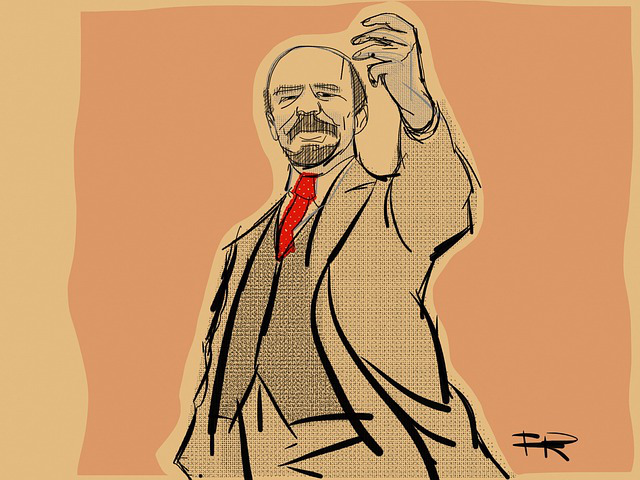
From Anne Applebaum’s article in the Washington Post:
History repeats itself and so do ideas, but never in exactly the same way. Bolshevik thinking in 2017 does not sound exactly the way it sounded in 1917… The current leader of the British Labour Party, Jeremy Corbyn, also comes out of the old pro-Soviet far left. He has voiced anti-American, anti-NATO, anti-Israel, and even anti-British (and pro-IRA) sentiments for decades — predictable views that no longer sound shocking to a generation that cannot remember who sponsored them in the past. Within his party there is a core of radicals who speak of overthrowing capitalism and bringing back nationalization….
By contrast, the neo-Bolsheviks of the new right or alt-right do not want to conserve or to preserve what exists. They are not Burkeans but radicals who want to overthrow existing institutions. Instead of the false and misleading vision of the future offered by Lenin and Trotsky, they offer a false and misleading vision of the past. They conjure up worlds made up of ethnically or racially pure nations, old-fashioned factories, traditional male-female hierarchies and impenetrable borders…
It’s worth reading. Ms. Applebaum correctly identifies many of the troubling trends threatening western democracy.
However, it is also a Whig history narrative too kind to today’s status quo. It paints with too broad a brush, pathologizing as “Bolshevism” any significant critique of the ascendant neoliberal view. Yes, many of the views denounced are truly awful, but its overly broad brushes excludes ideas – particularly economic ones – whose inclusion may prove necessary.
She chides both leftist and rightists for hewing to a false version of the past – in the case of the left, to a lack of knowledge on socialism’s failures that would have made figures like Corbyn seem like dinosaurs in the 1990s. On the right she derides the “a false and misleading vision of the past”, with “traditional male-female hierarchies”, “old-fashioned factories”, and “impenetrable borders” being exemplars of illusion.
If other readings of the past are false, the correct reading is the Whig one, which recognizes the inevitable rise of global markets, open borders, and ever-expanding individualism. In brief, history culminates in the worldview one might find in The Economist. It rules out any nationalization of industry or stronger borders of the kind common several decades ago. It cedes enormous determinative powers to the market to shape policy. It winks at the disconnectedness of what the left calls “the 1%” and the right refers to as “the cosmopolitan elite” (criticism of which Applebaum insinuatingly links with anti-Semitism) from the citizens with whom they share borders. It severely limits democratic policy choices under the rationale that history demonstrates we have no alternative but to pursue a set of policies broadly in line with New Labour.
Granted, such an “Economist worldview” has much to recommend it. At its best, it comes as close to supporting a worldview based on scientific policy as we humans are capable of. It is also a far better bet than radical alternatives peddled by left or right.
However, the limiting historical narrative profoundly ignores the sources of discontent that have bubbled to the surface in the new millennium. Why, for example, are so many young people drawn to Corbyn in 2017? It is indeed probable that many of his supporters do not understand the inefficiencies engendered by old Labour that led to their eclipse by the Blairites. But the suffering caused by 1970’s inefficiencies should not necessarily take on greater policy importance or relevance than the income stagnation and skyrocketing housing prices of the past several decades. After all, if history has proven nationalization and economic borders unfeasible, surely the past several decades of western middle and working class economic performance has likewise shown neoliberalism’s fruits to be highly mixed. It doesn’t take a Bolshevik to note that while economic inefficiency is an evil, so is social inequality – and it may be that sometimes a little inefficiency is worth greater equality, especially where the price is political instability.
Applebaum also chides today’s emerging right for its non-Burkean approach. In many ways, she is correct. There is virtually nothing of which a Burkean would approve in Trump’s delivery or lack of respect for institutions. There was likewise a distasteful messianic element in the man’s campaign – and though in this he paled to Obama, Trump’s incarnation has included an unsavoury strongman element. Ultimately, Trump presents a threat to democratic institutions that any Burkean must acknowledge.
Yet Applebaum goes too far in her accusations of “Bolshevism”, by which she broadly means wanting to destroy and create anew rather than conserve. In part this may be due to the breakneck speed of social change, which often demonizes those who wish to maintain institutions common only twenty years ago. But if the conservative is denied preservation of meaningful borders or traditional familial relationships, what is left? Such a stripped down conservativism leaves primarily economic rights, with a sprinkling of peripheral issues like Second Amendment claptrap – or in other words, the increasingly discredited worldview of old guard Republicans.
The crux of the problem is that there are few easy answers to today’s policy problems. Many of the prescriptions of the left and right are indeed the stuff of fantasy. But nor is the solution to pretend history ended in 1999, borrowing even from the lexicon of that century to mischaracterize and safely dismiss today’s diverse actors.
Ultimately, the neoliberal worldview may indeed prove the correct one: ever more connected markets, increasingly invisible borders, and traditional family and community structures swept away by liberated individualism. The economic inequalities of the past decades may yet, as neoliberals hope, level out one day – if not quite into a utopia rivaling the dictatorship of the proletariat, then at least into a world of modest, sustained, year-by-year middle-class wage growth.
Or it may not. One way forward economically may lie in the pattern common to capitalism in the past: adopting some of the notions of its critics while preserving the fundamental structure of the system. Illustrative in this were Bismarck’s adaptation of elements of the socialist platform or FDR’s New Deal break with austerity and limited government. I personally wonder whether some greater measure of “economic nationalism” (though free of the taint of Steve Bannon) may again be seen as necessary or fashionable – a trajectory made more likely if China, with its simultaneous emphasis on free trade and very strong economic nationalist tendencies, continues its national rejuvenation. For someone who deeply subscribes to the Whig reading, however, this may seem an unacceptable step backwards.
Even if that does not happen, it is clear that a Whig history narrative excludes important trends and legitimate challenges. It limits unnecessarily the options of policy makers and explains away too easily the failures of recent decades. As a result, it has often missed the popular discontent it must now face.
Share this:




